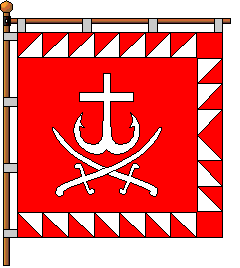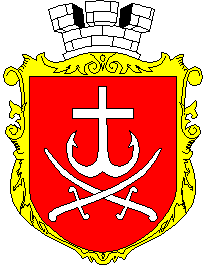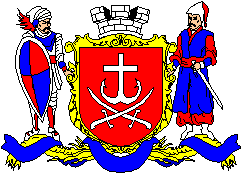 (1:1)
(1:1)from the site of Ukrainian Heraldry

Last modified: 2011-03-18 by andrew weeks
Keywords: vynnytsa | vinica | vinnytsia | anchor | sword |
Links: FOTW homepage |
search |
disclaimer and copyright |
write us |
mirrors
 (1:1)
(1:1)
from the site of Ukrainian
Heraldry
See also:
Other Sites:
From the site of Ukrainian
Heraldry:
"In May 16, 1993 by the decision of the session of the town
council a gonfalon was approved: a rectangular canvas with a
ratio of the sides: 1:1. In a red field there is an image of the
coat of arms of town. Three sides of gonfalon (except the side
near a flagstaff) have an edging of equilateral white triangles
with width of 1/8 of width of the gonfalon. The author is
J.Legun."
Phil Nelson, 7 July 1999

from the site of Ukrainian
Heraldry
From the site of Ukrainian
Heraldry:
"On the 16th of May 1993 town council session confirmed
(resolution No.28) a small emblem: in the gules field an argent
cross, the lower part of which is recercely, to the left and to
the right; under it - sabers in cross with their edges out."
Phil Nelson, 7 July 1999

from the site of Ukrainian
Heraldry
From the site of Ukrainian
Heraldry:
"City in Vinnytsa Oblast. The first mention refers to 1363
when it was a Lithuanian fortress. The name is connected with Old
Russian word "vino" (wine) - ransom, dowry.In 1640
Vladyslav IV granted the Magdeburg Right and an emblem - two
sabers and a hook. The crampony cross was used on town seals
during 300 years."
Phil Nelson, 7 July 1999
My ancient encyclopedia says, under the heading
"Magdeburg", "Magdeburg became a flourishing
commercial town during the 13th century, and was an important
member of the Hanseatic League..."Magdeburg law"
(Magdeburger Recht), securing the administrative independence of
municipalities, was widely adopted." Perhaps where the
source says "was given Magdeburg right" we should
translate "received the right of civic self-government"
or something similar.
John Ayer 8 July 1999
Victor Louis, in 'The Complete Guide to the Soviet Union',
1991, states: 'Vinnitsa's name probably derives from the old
Slavic word "vyeno" meaning "ransom" or
"transferred property".
Jarig Bakker 10 July 1999